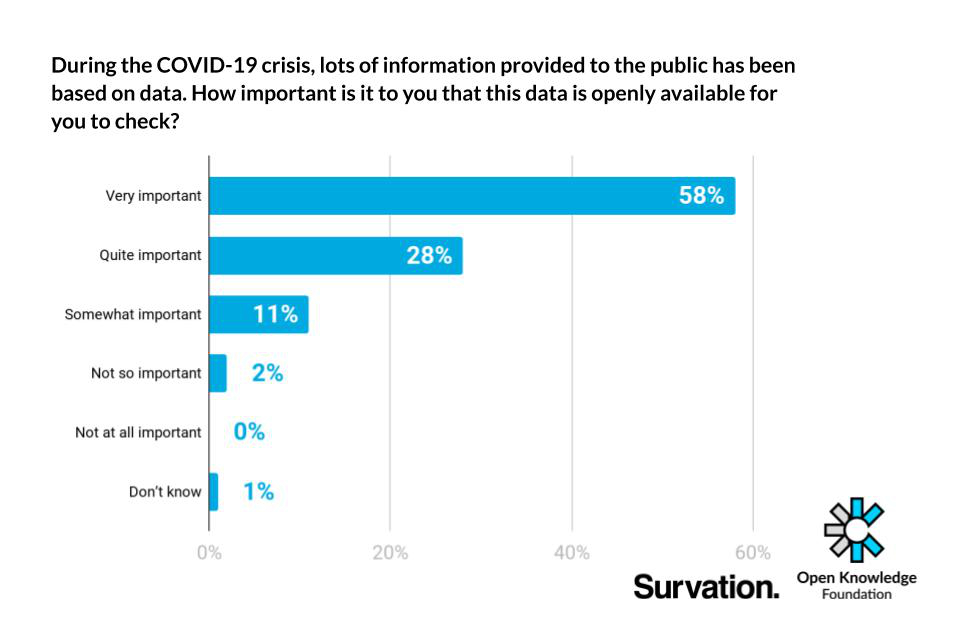A new opinion poll has revealed that people across the UK want openness from the government as it tackles the coronavirus pandemic.
The Survation poll for the Open Knowledge Foundation found that in response to COVID-19, people want data to be openly available for checking, they are more likely to listen to expert advice from scientists and researchers, and they oppose restricting the public’s right to information.
The poll found:
- 97% believe it is important that COVID-19 data is openly available for people to check
- 67% believe all COVID-19 related research and data should be made open for anyone to use freely
- 64% are now more likely to listen expert advice from qualified scientists and researchers
- Only 29% believe restricting the public’s right to information is a necessary emergency measure
- 63% believe a government data strategy would have helped in the fight against COVID-19
The UK Government has faced calls for greater transparency over the scientific advice given to ministers on the coronavirus outbreak.
The calls came after The Guardian revealed that the Prime Minister’s top aide, Dominic Cummings, had been attending meetings of the Scientific Advisory Group for Emergencies (SAGE).
Ministers have said they are following ‘the best science’, but concerns have been raised about data secrecy with the UK Government accused of acting too slowly, lagging behind on testing, and having insufficient supplies of Personal Protective Equipment (PPE).
Over a number of years the UK government has been developing a National Data Strategy with rules and guidelines on how to share data between organisations like the Department of Health and Social Care and the NHS. The strategy has not yet been published.
Meanwhile, the Scottish Government has also been criticised for measures to tighten Freedom of Information legislation.
Catherine Stihler, chief executive of the Open Knowledge Foundation, said: “At the heart of the response to the pandemic is data, which tells us what is happening in our communities.
“Ensuring that data is open is the first stage in the battle against the coronavirus.
“This poll shows that people in the UK want COVID-19 data to be openly available for checking, and that research and data should be made open for anyone to use freely.
“This is important as removing barriers to the use of intellectual property will ultimately help lead to a vaccine.
“The poll shows that measures to restrict the public’s right to information must be avoided, as transparency is more important than ever.
“People still trust the government to take the right decisions, but this will be eroded if information is withheld.
“One particularly encouraging finding is that people are now more likely to listen to expert advice.
“I am hopeful that the acceptance of basic facts will return after this pandemic and there will be a renewed focus on building a fair, free and open future.”
Poll results
Opinion poll conducted by Survation on behalf of the Open Knowledge Foundation. Fieldwork conducted 27-28th April 2020, all residents aged 18+ living in UK, sample size 1,006 respondents. Download the full report. Tables available here.
Q1. During the COVID-19 crisis, lots of information provided to the public has been based on data. How important is it to you that this data is openly available for you to check?
Very important: 58%
Quite important: 28%
Somewhat important: 11%
Not so important: 2%
Not at all important: 0%
Don’t know: 1%
Q2. Knowledge becomes ‘open’ when any non-personal content, information or data is free to use, re-use and redistribute – without any legal, technological or social restriction. Closed knowledge is when non-personal content, information or data is not shared. How important is it to you that knowledge relating to the COVID-19 crisis is open?
Very important: 54%
Quite important: 30%
Somewhat important: 11%
Not so important: 3%
Not at all important: 0%
Don’t know: 2%
Q3. Over a number of years the UK government has been developing a National Data Strategy with rules and guidelines on how to share data between organisations like the Department of Health and Social Care and the NHS. The strategy has not yet been published. Which of the following statements best reflects your views?
A government data strategy would have helped in the fight against COVID-19: 63%.
A government data strategy would not have helped in the fight against COVID-19: 20%.
Don’t know: 18%.
Q4. The UK government has said that it will be guided by scientists when it comes to lifting the national lockdown and planning social measures needed to prevent future COVID-19 outbreaks. Not all of the data provided to politicians has been made public. Which of the following statements best reflects your views?
I trust the UK Government to take the right decisions for the country based on confidential evidence and data: 59%.
I do not trust the UK Government to take the right decisions for the country based on confidential evidence and data and they should be more transparent: 35%.
Don’t know: 6%.
Q5. Thinking about the work being done by scientists and drug companies towards creating a COVID-19 vaccine, which of the following statements best reflects your views?
All COVID-19 related research and data should be made open for anyone to use freely: 67%.
All COVID-19 related research and data should be kept private: 17%.
Don’t know: 16%.
Q6. Has the COVID-19 pandemic made you more or less likely to listen to expert advice from qualified scientists and researchers?
Far more likely: 31%
Slightly more likely: 33%
Neither more or less likely: 28%
Slightly less likely: 4%
Far less likely: 1%
Don’t know: 3%
Q7. Governments across the world are passing new emergency laws to deal with the coronavirus pandemic. Many governments have temporarily altered, delayed or suspended the public’s right to information. In the UK, the Scottish Government has granted time extensions for responding to Freedom of Information requests from the public. Which of the following statements best reflects your views?
Restricting the public’s right to information is a necessary emergency measure: 29%.
Restricting the public’s right to information is an unnecessary emergency measure: 52%.
Don’t know: 18%.
The official voice of the Open Knowledge Foundation.









